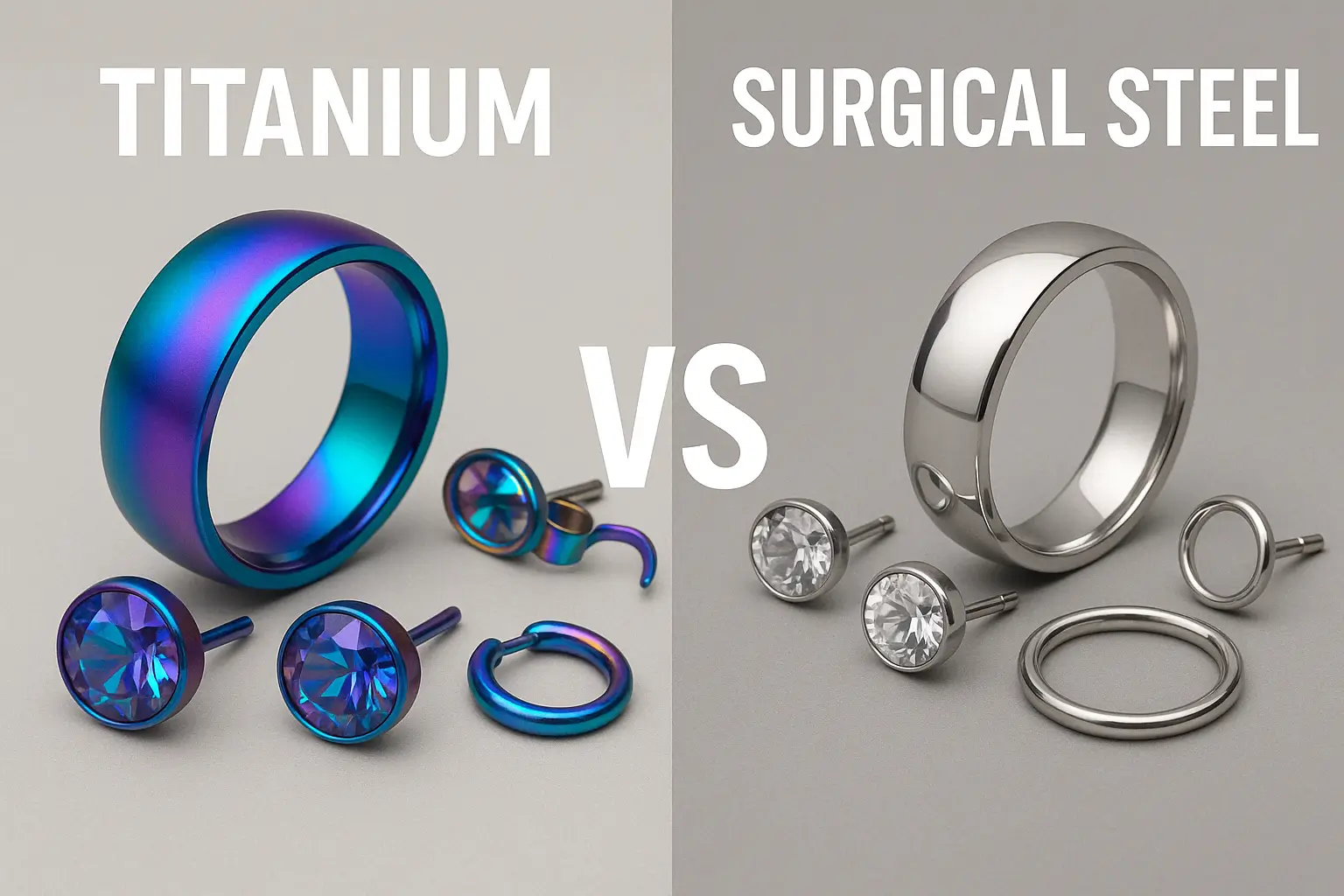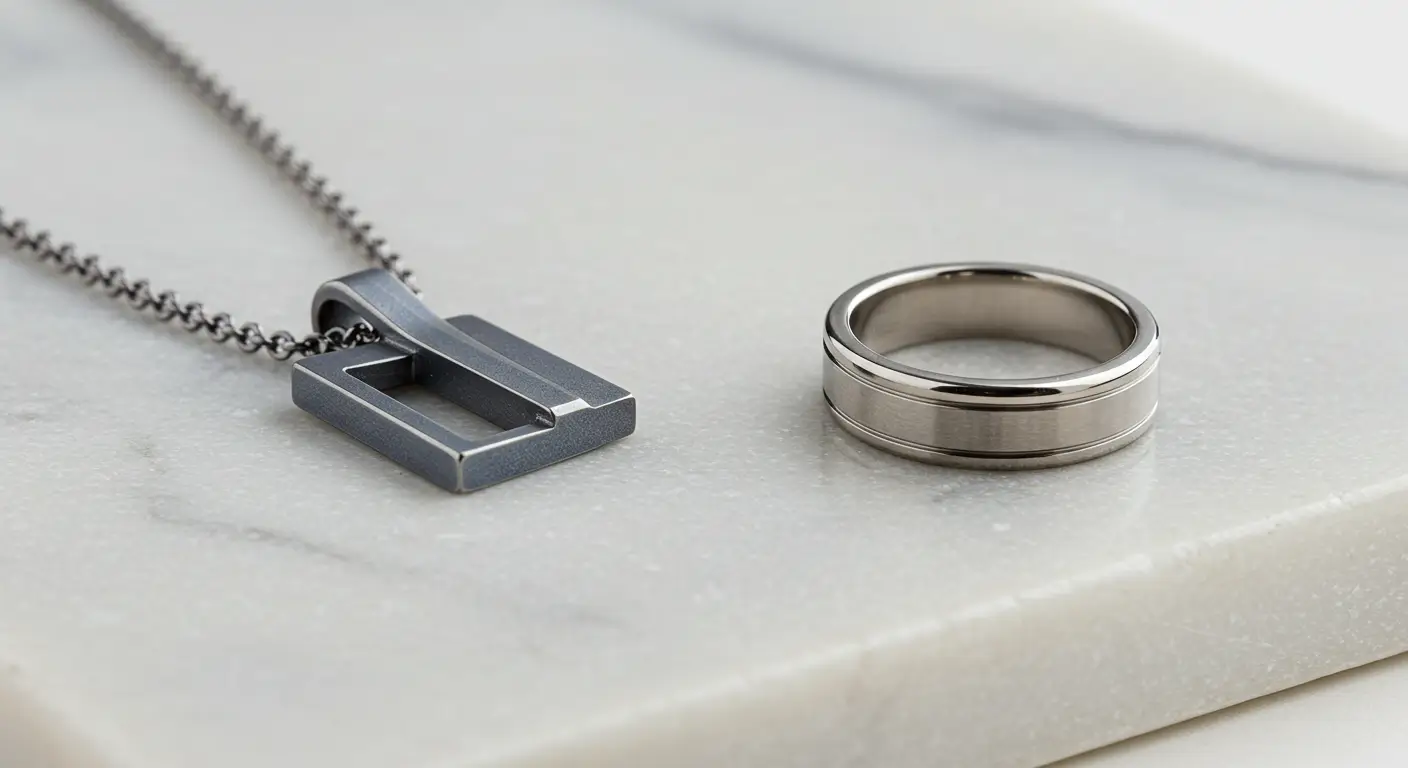Titanium vs. Surgical Steel Jewelry - Which Is Better for Piercings?
Titanium and surgical steel are two different materials that are used in jewelry production. But choosing one of these two popular materials can be a little difficult.
If you are also stuck in a similar situation, then this guide, "Titanium vs Surgical Steel" is for you. In this guide, we will compare both the materials on the basis of different key factors. I am sure that all this information will help you in making decisions.
Titanium vs. Surgical Steel Key Factors:
Are you ready to compare which one is better, titanium jewelry or stainless steel nose ring? Just dive into:

1. Material Composition
Titanium
Titanium (Ti) is very popular because it is naturally lightweight and strong. But pure titanium is very soft and can be easily shaped. To increase its durability, aluminum and vanadium are mixed.
For high-quality jewelry, grade 5 titanium is used, whose composition is 90% titanium, 6% aluminum (Al), and 4% vanadium (V), which means it is nickel-free and safe for sensitive skin.
Surgical Steel
Surgical steel is a special type of stainless steel that is mostly used to make surgical tools. It is the mixture of different metals, including iron, chromium, low-carbon steel, nickel, and other metals.
The presence of chromium and nickel makes it durable and corrosion-resistant. Due to its rustproof shine and durability, it becomes ideal for piercing jewelry.
2. Allergies and Sensitivities
Titanium
Titanium is considered to be the most skin-friendly metal in the world. It is 100% nickel-free, which makes it ideal for sensitive skin. The hypoallergenic property of this metal is considered to be the best choice for initial piercing.
You can judge the safety of titanium from the fact that it is also used in bone implants and dental screws. Which means that it is highly compatible with the human body and is allergy-free.
Surgical Steel
While surgical steel contains a small amount of nickel, it can cause an allergic reaction. If you are allergic to nickel or have extremely sensitive skin, it can cause irritation to your skin. In some cases, it can cause infection. For this reason, it is not recommended for an initial piercing ring.
3. Weight
Titanium
As we know, titanium is naturally lightweight. Its density is approximately 4.5 g/cm³ (grams per cubic centimeter). It is 60% lighter than steel. If you want to feel lightweight and comfortable while wearing it, there is no better option than titanium.
Surgical Steel
While steel is heavier than titanium, it has a density of 7.9–8.1 g/cm³ (grams per cubic centimeter). If you want a little heavier, more luxurious, and more durable feel, you can choose surgical steel.
4. Corrosion Resistance
Titanium
Titanium has a natural oxide coating (titanium dioxide—TiO₂) on its surface, which completely protects it from rusting and tarnishing. This metal has a unique self-healing power—even if it gets scratched, the oxide layer is rebuilt, which maintains its durability.
This is why titanium slate does not deteriorate even after coming in contact with water, pool water, sweat, and human acids, making it unmatched in strength and corrosion resistance.
Surgical Steel
Surgical steel contains chromium, which protects the surface from rusting, but its protection is not as strong as titanium.

5. Color Options
Titanium
Titanium's surface is a classic metallic gray, which gives it a polished and shiny look. However, it can be painted in different colors with the anodizing process. Anodizing is an electrochemical process that creates an oxide layer on the surface of titanium, allowing it to create new shades.
This process results in titanium producing anodized colors such as blue, purple, green, gold, rose, and rainbow. Most importantly, these colors do not fade because they are not just painted on the surface but become part of the structure of titanium through a chemical reaction, which maintains its durability and aesthetics.
Surgical Steel
Surgical steel is often available in a dazzling silver finish, which gives it a reflective shine and a professional look. This material cannot be anodized like titanium.
However, plating and painting are used to give surgical steel a variety of colors. But these colors are temporary and become dull over time when the steel is exposed to moisture. Therefore, it is better to keep steel in its natural silver finish for its original shine.
6. Cost & Value for Money
Titanium
Titanium jewelry is a little expensive compared to surgical steel because it is nickel-free and is maximally pure and lightweight. Its price range is $6.25-$11.50+, depending on design and grade.
Surgical Steel
On the other hand, surgical steel jewelry is affordable because it is not pure. Due to its not being pure, it can be used for healed piercings, but nickel is not safe for sensitive skin.
7. Healing Time & Piercing Safety
Titanium
Titanium is naturally non-reactive and biocompatible, and titanium jewelry is 100% nickel-free and lightweight. The hypoallergenic property of this metal does not cause any effect in the healing process. This is why the body heals quickly.
Surgical Steel
But steel piercing jewelry is not pure, and it causes irritation because of the presence of nickel in it. Nickel can also cause an allergic reaction or cause a delay in healing.
8. Cleaning and Maintenance
Titanium
The surface of titanium is non-reactive, due to which sweat, dead skin, and body oils do not accumulate on it easily; hence, cleaning is required less frequently.
Surgical Steel
Though corrosion-resistant but slightly more reactive than titanium, it absorbs skin oils and sweat more easily.
Titanium vs Surgical Steel – Comparison Table
| Key Factor | Titanium | Surgical Steel |
|---|---|---|
| Composition | Pure titanium or alloy (ASTM F136), nickel-free | Steel + chromium + nickel (can cause irritation) |
| Skin Friendliness | Hypoallergenic – no allergic reactions | May cause allergies in sensitive skin |
| Healing Suitability | Perfect for fresh piercings | Suitable only for healed piercings |
| Maintenance | Low maintenance, rustproof, doesn't tarnish | Needs occasional cleaning and polishing |
| Color Options | Matte, black, rainbow anodized (limited) | Silver, gold-tone, black – more variety |
| Weight | Super lightweight, very comfortable | Heavier – gives a solid feel |
| Durability | Stronger than steel, corrosion-resistant | Durable but may scratch with wear |
| Resizing/Repair | Difficult to resize or engrave | Easier to resize and engrave |
| Cost | More expensive – premium quality | Budget-friendly – more affordable |
| Design Variety | Simple, sleek modern styles | Traditional and artistic designs available |
| Everyday Wear | Perfect for daily wear – safe & light | Good for daily wear (if no allergy) |
| Drawbacks | Pricey, hard to resize, anodized color may fade | Nickel content, not safe for fresh piercings |
FAQs
Is titanium or steel better for piercing jewelry?
If your skin is very sensitive, then titanium is the best for you, as it is nickel-free and highly biocompatible, due to which there is no fear of any allergic reaction. Most of the professionals recommend titanium jewelry for new piercings. Because healing is faster with this.
Can I wear titanium jewelry every day?
titanium jewelry lightweithg and non reactive jo is ko senstive skin and long wear ka liya perfect consider kiya jata ha. Its surface is waterproof, and it cannot scratch easily.
Disadvantages of Titanium Jewelry
| Disadvantage | Details |
|---|---|
| Expensive | High-quality metal, but more costly than surgical steel or silver. |
| Not Easy to Resize/Repair | Very hard metal – resizing, engraving, and repairs are limited. |
| Limited Design Flexibility | Mostly available in simple, modern styles due to metal hardness. |
| Color Can Fade | Anodized colors may fade with regular wear and friction. |
| Feels Too Light | Extremely lightweight – may feel less premium to some users. |
Conclusion - Titanium vs. Surgical Steel
Titanium and surgical steel are both popular and durable materials, but both materials are unique and useful in their own ways.
If you have sensitive skin, a fresh piercing, or are looking for jewelry for long-term daily wear, titanium may be your best choice.
On the other hand, if your style and affordability are important, and the piercing is already healed, surgical steel is also a reliable option.
 Nose Ring Haven
Nose Ring Haven